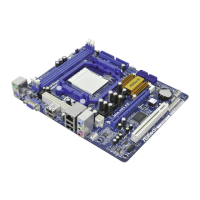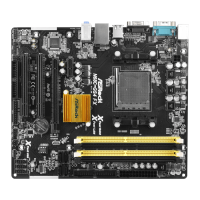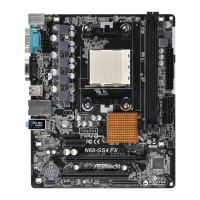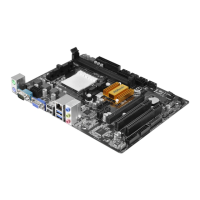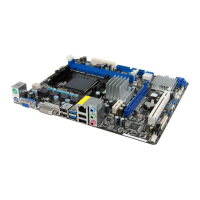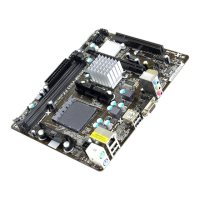Do you have a question about the ASROCK N68C-GS4 FX and is the answer not in the manual?
Lists all items included in the motherboard package.
Details the technical specifications of the motherboard components.
Highlights special features and technologies offered by the motherboard.
Illustrates and labels the physical components on the motherboard.
Describes the external connectors and ports on the motherboard's rear panel.
Lists essential safety measures before installing hardware.
Step-by-step guide for installing the CPU onto the motherboard socket.
Instructions for mounting the CPU cooler assembly.
Details the process and configurations for installing RAM modules.
Explains the types and installation of expansion cards.
Describes the function and configuration of motherboard jumpers.
Details the motherboard's internal headers and connectors for peripherals.
Provides instructions for installing system drivers from the support CD.
Guide for installing operating systems without RAID configuration.
Guide for installing operating systems with RAID configuration.
Explains a feature for stable overclocking by fixing PCI/PCIE buses.
Introduces remote control and wake-up features for the system.
Explains how to access and use the BIOS setup utility.
Details the system overview displayed upon entering the BIOS utility.
Section for adjusting overclocking-related settings and parameters.
Covers advanced system configurations for CPU, Chipset, ACPI, etc.
Displays system hardware status like temperatures, fan speeds, and voltages.
Configures boot device priority and other boot-related settings.
Allows setting and managing supervisor and user passwords for system security.
Options for saving, discarding changes, or loading default BIOS settings.
Lists supported operating systems and general installation guidance.
Details the contents and usage of the motherboard's support CD.
| Non-ECC | Yes |
|---|---|
| Memory channels | Dual-channel |
| Memory slots type | DIMM |
| Number of memory slots | 2 |
| Supported memory types | DDR3-SDRAM |
| Maximum internal memory | 16 GB |
| Supported memory clock speeds | 1066, 1333, 1600, 1866 MHz |
| System bus rate | 2 GT/s |
| Processor socket | Socket AM3+ |
| Processor manufacturer | AMD |
| Compatible processor series | AMD Phenom II X2, AMD Phenom II X3, AMD Phenom II X4, AMD Phenom II X6 |
| Processor thermal power (max) | 95 W |
| Maximum number of SMP processors | 1 |
| Processor system buses supported | 1000 MHz |
| Number of SATA II connectors | 4 |
| Number of Parallel ATA connectors | - |
| USB 3.2 Gen 1 (3.1 Gen 1) connectors | 0 |
| RAID levels | 0, 1, 0+1, 5, JBOD |
| Supported storage drive interfaces | SATA II |
| USB 2.0 ports quantity | USB 2.0 ports have a data transmission speed of 480 Mbps, and are backwards compatible with USB 1.1 ports. You can connect all kinds of peripheral devices to them. |
| Ethernet interface type | Gigabit Ethernet |
| Audio chip | Realtek ALC662 |
| Certification | FCC, CE, WHQL |
| Component for | PC |
| Power source type | ATX |
| Motherboard chipset | NVIDIA nForce 630a |
| Audio output channels | 5.1 channels |
| Motherboard form factor | micro ATX |
| Motherboard chipset family | NVIDIA |
| Windows operating systems supported | Windows 7 Enterprise, Windows 7 Enterprise x64, Windows 7 Home Basic, Windows 7 Home Basic x64, Windows 7 Home Premium, Windows 7 Home Premium x64, Windows 7 Professional, Windows 7 Professional x64, Windows 7 Starter, Windows 7 Starter x64, Windows 7 Ultimate, Windows 7 Ultimate x64, Windows 8, Windows 8 Enterprise, Windows 8 Enterprise x64, Windows 8 Pro, Windows 8 Pro x64, Windows 8 x64, Windows 8.1, Windows 8.1 Enterprise, Windows 8.1 Enterprise x64, Windows 8.1 Pro, Windows 8.1 Pro x64, Windows 8.1 x64, Windows Vista Business, Windows Vista Business x64, Windows Vista Enterprise, Windows Vista Enterprise x64, Windows Vista Home Basic, Windows Vista Home Basic x64, Windows Vista Home Premium, Windows Vista Home Premium x64, Windows Vista Ultimate, Windows Vista Ultimate x64, Windows XP Home, Windows XP Home x64, Windows XP Professional, Windows XP Professional x64 |
| Graphics card | GeForce 7025 |
| DirectX version | 9.0 |
| BIOS type | AMI |
| ACPI version | 1.1 |
| BIOS memory size | 64 Mbit |
| Cables included | SATA |
| Width | - mm |
|---|

